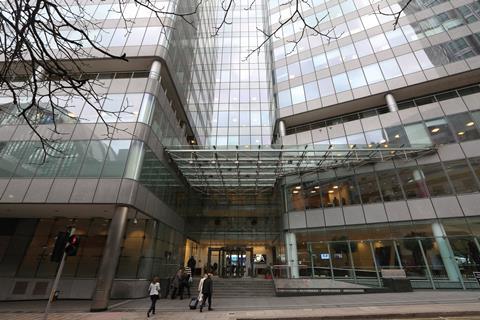There is high praise for the City’s own tribunal. Should it have a bigger remit? Marialuisa Taddia reports
The low down
Many tribunals number among the courts that are overwhelmed by their caseloads. Not so the Upper Tribunal of the Tax and Chancery Chamber (UTTCC) which hears disputes arising from decisions by the City’s regulators. But although London continually vies to be the global top spot for financial services, in the year to March 2020 the tribunal received just 432 disputes. Maybe its very existence improves the decision-making of regulators keen that their deliberations be ‘tribunal-proof’. The quality of the tribunal’s decisions wins high praise from practitioners. Could a dramatic expansion of its remit fill a ‘justice gap’ experienced by SMEs with claims against banks? The government is lukewarm on the idea, preferring the ‘soft law’ solutions provided by compensation schemes. The cost of that preference and banks’ tendencies to settle big cases is that the UK is short on the cases that develop the certainties created by hard law.
The tribunal for disputes between financial services firms and their regulators has been a success and there have been moves to extend its remit to disputes involving small and medium-sized businesses (SMEs). However, there are concerns that it is being underused, which has negative consequences for transparency and, potentially, for financial stability.
The Upper Tribunal of the Tax and Chancery Chamber (UTTCC) was created by the Tribunals, Courts and Enforcement Act, which came into force in November 2008, but it was granted a narrow range of power.
‘The tribunal itself has got a very limited statutory jurisdiction and actually hears a relatively modest number of cases,’ says Simon Morris, a partner at CMS. Among them are challenges against decisions by the Financial Conduct Authority (FCA), the Prudential Regulation Authority (PRA) and other financial services regulators concerning, for example, permissions to provide financial services, fines for market abuse and disciplinary measures.
Yet Morris, a member of the City of London Law Society Regulatory Committee, says that ‘within its very specific remit, the tribunal is competent and it is effective’.
‘My experience has been that, when the tribunal is used, it is a very effective forum for reopening decisions of the FCA,’ says Blackstone Chambers’ Javan Herberg QC. ‘Most of its remit tends to be completely de novo, so it is not just reviewing the FCA’s decisions,’ he says, adding: ‘It is really a primary decision-maker.’
The UTTCC, like other tribunals, sits as a panel with ‘a legally qualified chair and two lay effectors who have market experience, just like the RDC does’, says Herberg. The Regulatory Decisions Committee (RDC) is an FCA board committee that operates separately from the rest of the regulator; it’s the FCA’s decision-maker for contested cases that are usually considered by a panel of three members. The RDC’s process is administrative, rather than judicial, and it is the final stage of decision-making within the FCA.
'My experience has been that, when the tribunal is used, it is a very effective forum for reopening decisions of the FCA'
Javan Herberg QC, Blackstone Chambers
The UTTCC, headed by barrister Sir Antony James Zacaroli, is made up of specialist judges appointed by the lord chancellor, among them Timothy Herrington, who was chairman of the RDC until he moved to the tribunal in February 2012. Herberg says Herrington has been ‘a very effective and independent judge’ and ‘confident in taking cases against the FCA to the tribunal’.
‘My only experience is that the tribunal is independent, it will hear the case properly, and will come to a decision that one can normally have confidence in, win or lose, as it were,’ Herberg adds.
High praise
Morris is equally glowing in his praise, saying Herrington, a former Clifford Chance partner and an expert in regulation of financial markets, is ‘immensely versatile in regulation and comes up, when we have questions, with really high-quality decisions’.
‘The UTTCC judgments are well written, well-structured and thorough,’ says Rachel Couter, a partner in the commercial and regulatory team at Osborne Clarke in London. The role of the UTTCC is not to challenge decisions by the FCA or other financial regulators, such as the PRA and the Pensions Regulator, but to hear relevant matters from scratch and to form its own view of the facts and, in disciplinary cases, what action the FCA should take, if any, Couter explains.
‘Rightly or wrongly, however, the perception is that the UTTCC generally starts from the premise that the FCA must have been justified in the actions it wants to take and it is very difficult to persuade the UTTCC that the FCA is wrong,’ she adds.
But, in a ‘welcome’ decision in Financial Solutions (Euro) Ltd v FCA in April this year, the UTTCC concluded that the FCA ’s treatment of the regulated firm was particularly poor and found in its favour, says Couter: ‘This proves that, in the right case, the UTTCC does provide the independent challenge it is set up for.’
At issue was the FCA’s decision to cancel the firm’s regulatory permissions because it had failed to pay fees and levies to the FCA and did not have professional indemnity insurance.
Yet the financial services cases that are taken to the tribunal are ‘very fact specific’ and also ‘fairly infrequent’, says Couter. ‘There have just been a handful of substantive hearings in the past 18-24 months, with the vast majority of the tribunal’s work taken up by tax cases.’ The UTTCC principally decides appeals on points of law from the First-Tier Tribunal Tax Chamber. It also has a limited judicial review jurisdiction, for example, on certain decisions by HM Revenue and Customs, the Pensions Regulator and the Charity Commission.
In the financial year ending 31 March 2020, the UTTCC received a total of 432 cases (the Ministry of Justice does not provide a breakdown by case type). That is a tiny proportion of the tribunals’ overall caseload of 393,080, which included 103,973 cases to employment tribunals; 160,423 to the Social Security and Child Support tribunals; and 7,694 to the Special Educational Needs and Disability tribunals.

This paucity of cases seems at odds with the FCA being the conduct regulator for nearly 60,000 financial services firms and the PRA regulating around 1,500 banks, building societies, credit unions, insurers and major investment firms.
‘The biggest feature of the tribunal is that institutions have simply not used it,’ says Herberg. Even to contest an FCA decision through a referral to the RDC has been ‘a push for most institutions’, which prefer to settle with the FCA at an early stage.
Proceedings in all courts, including the UTTCC, are public. But there has been ‘a big aversion to open public hearings’ in the financial services sector says Herberg, particularly since the crisis of 2008-09.
‘Hardly any major institution has ever gone to the UTTCC. Partly it is reputation, and partly it is that they don’t want to spend the next two to three years fighting the regulator,’ says Morris. ‘Big firms generally want to move on.’
It is also fair to say, firms probably decide it is worth taking an immediate financial hit rather than air their dirty washing in public and risk the bigger losses that could result in losing a hearing.
Given the small number of financial services cases that proceed to the tribunal, it is difficult to discern trends in substantive decisions. That is, apart from its ‘consistent refusal to find against the presumption that FCA decision notices should be published pending the outcome of the reference to the UTTCC, unless exceptional unfairness and disproportionate damage can be shown’, says Couter.
David Harris, a partner at Norton Rose Fulbright, adds: ‘The privacy applications before the UTTCC, where individuals were seeking to prevent the publication of decision notices, reiterate the strong presumption in favour of open justice and transparency of decision-making, and the high bar individuals have to reach to demonstrate publication would cause them a disproportionate level of damage.’
Individuals have made greater use of the tribunal, according to Herberg. Take the FCA’s decision in September 2018 to ban Christian Bittar, who had sought to manipulate global Euribor interest rates, ‘from performing any regulated function’. This followed the former Deutsche Bank’s trader’s referral to the tribunal, which directed the FCA to not impose a £6.5m penalty on him, but confirmed the regulator’s ban on Bittar which was issued in April 2017. In separate criminal proceedings, Bittar was sentenced to five years and four months in prison and ordered to pay £2.5m by way of a confiscation order.

There are other examples. In November 2018, the tribunal upheld the FCA’s decision to fine and ban two former executives of Keydata. Stewart Ford was fined £76m (a record for an individual) and Mark Owen £3,240,787. Earlier this year, Conor Foley, the ex-chief executive of WorldSpreads, turned to the tribunal to challenge a financial penalty of £658,900 for market abuse and a prohibition to perform any role in regulated financial services.
Herberg – who acted for ex-JP Morgan banker Achilles Macris in the ‘third party rights’ case against the FCA that culminated in the Supreme Court in March 2017 – says that more recently he has detected ‘an increased willingness on the part of institutions to at least consider challenging the FCA in the tribunal and I think it will start to happen more’.
Virtually all firm cases settle at ‘stage 1’ where they can benefit from a discount of up to 30% of a proposed financial penalty. To make contentious regulatory matters more transparent and encourage more firms to refer cases to the RDC or the tribunal, the FCA introduced the ‘partly-contested cases’ route in 2017 that allows firms and individuals to agree certain elements of the case against them and contest others, using a focused resolution agreement (FRA) while still getting some level of discount on the penalty. This enables the parties to narrow the dispute which then proceeds to the RDC on a limited basis – with recourse on appeal from the RDC to the UTTCC.
At the time, Mark Steward, the FCA’s director of enforcement and market oversight, said: ‘It is essential that our enforcement decision-making processes command public confidence and operate both efficiently and fairly.’ This followed a Treasury review of the regulator’s enforcement powers in 2014 and criticism of its predecessor, the Financial Services Authority, for failing to properly investigate the collapse of HBOS (the Bank of Scotland’s holding company) in 2008.
But in a speech in February, Steward said that only ‘a small number of parties’ had taken the partly contested case option.
This may soon change. Harris highlights the UTTCC’s first decision in 2019 under the partly contested process. In the case in question, the firm accepted the facts put forward by the FCA, as well as liability for the breaches identified, but disputed the penalty.
‘Although the tribunal upheld the FCA’s proposed penalty, we expect to see an increase in use of the FRA procedure and may see penalty reductions in future cases at the tribunal,’ he says, adding: ‘Firms will certainly be hoping that the tribunal demonstrates that it is prepared to reduce fines where appropriate, particularly given that fines in FRA cases have been known to increase at the earlier Regulatory Decisions Committee stage,’ he adds.
Another important factor is that ‘the FCA continues to be quite aggressive in levying large fines, so there comes a point where, if you are picking fines of £30, £40 or £50 million, it is simply worth your while to go to the tribunal,’ says Herberg. In 2019, the FCA imposed financial penalties of more than £310m on firms and awarded £231m in restitution payments.
If 2019 was a record year, it is worth noting that between 1 January and mid-September the FCA imposed just four fines, compared to 16 issued in the same period last year, according to City law firm RPC, which cited ‘disruptions to enforcement activities as a result of Covid-19 and lockdowns’ as possible reasons.
What might also explain the relatively low number of cases heard by the tribunal is that there is no general rule that the ‘loser pays’ explains Couter. ‘Awards of costs are only permitted if the UTTCC considers that either the FCA or the referring party has acted unreasonably in making or defending the reference or has behaved inappropriately during the course of the UTTCC proceedings’. This is the case, for example, if a party consistently failed to comply with the tribunal’s deadlines or failed to produce evidence to support its case, or if the FCA’s proposed decision was unreasonable. ‘Costs awards are, therefore, rare. But they do happen if the UTTCC considers that the FCA behaved egregiously, as the UTTCC clearly did in the Financial Solutions (Euro) case,’ she says.
How many cases is enough?
The extent to which financial firms are using Upper Tribunal of the Tax and Chancery Chamber (UTTCC) is not the only measure of its success.
‘The existence of a tribunal, in my opinion, has had the most significant impact on the development of regulatory decision-making in this jurisdiction,’ CMS partner Simon Morris argues.

‘The fact that there is a tribunal which stands ready to hear and adjudicate on a very wide range of FCA and PRA formal decisions has the most enormous, albeit invisible impact of making sure that when any regulator takes any decision, it [does so] with great care and deliberation because it knows that the decision it makes has got to be “tribunal-proof”,’ says Morris. He adds that even though the regulators know that few cases go to the tribunal ‘the fact that any of them could means that they proceed, generally speaking, carefully and prudently’.
Commenting on the tribunal’s jurisprudence of the past two years, Norton Rose Fulbright partner Katie Stephen says: ‘The cases demonstrate that the [UTTCC] is an important check and balance for the regulators’ supervisory and enforcement decision-making processes.’
In one case the tribunal found that a prohibition order proposed by the FCA was not merited, despite agreeing that the relevant individual had demonstrated a lack of integrity, Stephen says. ‘In the context of upholding a regulatory decision, the tribunal has also provided guidance to the FCA on dealing with situations in which firms disagree with the regulator’s view and has commented on “long periods of delay caused by the authority’s lack of action”,’ she adds, referring to another case decided in 2019.
Mind the gap
But others say there remains a gap in the market for dispute resolution. Highlighting the ‘shortcomings’ of the current system, Robbie Constance, partner and head of financial services regulatory at DWF, says ‘the tribunal is just inaccessible’ and ‘the FCA continues pretty much unchallenged’.
Constance says the Libor and foreign-exchange [FX] rigging scandals, where regulators levied record fines on lenders, illustrate his point. ‘They broadly all settled for about the same amount of money at about the same time, so none of those important potential legal issues about Libor and FX fixing were ventilated before the financial services tribunal. A few went before Southwark Crown Court, but from a regulatory perspective we end up not getting to hear much proper law,’ says Constance.
He adds: ‘I feel increasingly that we, as lawyers in this sector, are ever more regulatory consultants looking at the liabilities created by an ombudsman, the regulations created by parliament, the Treasury, the FCA, almost detached from good old-fashion common law.’
Richard Samuel, a barrister at 3 Hare Court, put forward the idea of a permanent, specialist financial services tribunal in three articles published in the Capital Markets Law Journal in 2016, arguing that it would reduce regulatory uncertainty by providing ‘definitive interpretations of regulations (including the FCA Handbook)’.
'None of those important potential legal issues about Libor and FX fixing were ventilated before the financial services tribunal'
Robbie Constance, DWF
Samuel tells the Gazette: ‘The point about [an FST] is that it is meant to be able to produce high-quality decisions on law at a low cost, that is the essence of it. It is accessible to the parties who need it, but it is producing high-quality decisions on which the rest of the market can rely.’
Samuel’s suggestion prompted the All Party Parliamentary Group (APPG) on Fair Business Banking to launch an inquiry into the idea (Lord Dyson sat on the board of the inquiry), The APPG was supportive of the concept and led two debates, in December 2016 and January 2018, in the House of Commons. Next, two reports came out in October 2018: a review commissioned by UK Finance and led by Simon Walker CBE opposed the idea of an FST because it would be ‘expensive for government and for participants’, and one on SME Finance by the Treasury Select Committee concluded that ‘expanding the remit of the [Financial Ombudsman Service (FOS)], as proposed by both the FCA and Simon Walker, will still leave a gap in the market for dispute resolution’.
However, the report continued: ‘Larger, more complex SME disputes will be either ineligible or unsuitable for the ombudsman, yet those bringing these disputes may lack the resources required for litigation. The committee believes that a Financial Services Tribunal is required to handle these disputes, and that such a body would usefully complement the expansion to the FOS’s remit proposed by the FCA.’

The proposal has stalled, due in part to Covid-19, but Samuel says that ‘it continues to maintain a lot of political interest’ and ‘it comes up in the radar when there is a new scandal that comes along’.
The GRG case is an example. In its final report into RBS’s now-defunct Global Restructuring Group in June 2019, the FCA said that it would take no action against the lender or senior staff, despite evidence of ‘systemic and widespread’ mistreatment of SME business customers between 2008 and 2013. Kevin Hollinrake MP, co-chair of the APPG on Fair Business Banking, criticised the report for being ‘another complete whitewash’; while then Treasury Select Committee chair, Nicky Morgan MP, said: ‘The government should also reconsider its rejection of the committee’s proposal for the introduction of a Financial Services Tribunal for SMEs to settle disputes with their banks.’
‘The proposal to create a Financial Services Tribunal was to allow SMEs, which were too large to access the FOS, to have a place to resolve their disputes without having to go to the courts with the inherent costs of litigation,’ says Couter, adding that this idea ‘does not appear to have to have been significantly progressed’. Conversely, what has gone ahead is the alternative proposal, following the Walker review, to create an independent dispute resolution body for businesses with annual turnovers of up to £10m that are ineligible for the FOS, she points out.
The Business Banking Resolution Service (BBRS) is being set up in consultation with various SME representative bodies, including the APPG on Fair Business Banking. Seven of the largest UK banks are participating to the service, which is currently in the ‘live pilot’ stage and is planning to launch a full service later this year.
The FOS’s jurisdiction was also extended in April 2019 to businesses with annual turnovers of up to £6.5m and the BBRS will be given jurisdiction to hear unresolved disputes from as far back as 2008 for businesses that would now be eligible for the FOS, but were not at the time, Couter adds.

Under the BBRS scheme, the maximum award is £600,000. Last year, the FOS increased its maximum compensation limit from £150,000 to £350,000.
‘At the moment, there seems to be an incremental expansion of soft law,’ says Constance. ‘But none of it is leading towards public, predictable, certain legal outcomes.’ Long-term this may have an ‘adverse effect’ on the UK’s financial services sector post-Brexit, he argues.
The BBRS and FOS produce ‘soft’ rather than ‘hard’ legal outcomes, adds Samuel. The barrister points to the Law Society’s global legal centre campaign which promotes English law as the most commonly used law in international business as it is ‘flexible, predictable and stable’ and asks: ‘Why then are we creating a black box of unpredictable law around the regulation that is governing a huge part of our economy, which is the financial services sector?’
So how would Samuel’s proposed new tribunal co-exist with the UTTCC? One option would be to create a new ‘chamber’ for financial services disputes operating under the Tribunals, Courts and Enforcement Act, he says. The other, would be to expand the jurisdiction of the UTTCC to enable SMEs to enforce their ‘private’ rights against financial institutions.
The tribunal would be modelled on employment tribunals or the Competition Appeal Tribunal, powers of which were expanded under the Consumer Rights Act 2015 to include a fast-track procedure for SMEs.
‘The point is that you are dealing with a private law matter where there is a significant imbalance of power between one party and the next, for example, employer and employee,’ says Samuel. ‘The purpose of the tribunal, as opposed to the court, is to flatten out that power imbalance in the way that courts don’t.’
Writing in the Capital Markets Law Journal in 2016, he said: ‘Unlike courts, a judge chairing a tribunal makes his decision equally as one of three: he is joined by market experts from either side of the case, in this case, by a member of the financial services industry and by a representative of small business.’
A third option would be to create a ‘junior’ version of the High Court’s Financial List, which deals with cases worth more than £50m. However, Samuel insists: ‘You want the best quality decision-making at the lowest possible price, and I think a tribunal is probably right for that.’
The jury appears to be out on the merits of extending the UTTCC’s jurisdiction.
The genesis of the current system goes back to when the Financial Services and Markets Act 2000 was going through the House of Commons and the House of Lords, Morris recalls. It was designed by the Treasury with the UTTCC ‘intended as a separate tribunal to deal with certain FCA and PRA decisions and all the other matters go to the High Court’.
Morris argues that the tribunal currently delivers ‘really high-quality decisions’ with a degree of predictability. ‘I would be very reluctant to see the tribunal diluted by willy-nilly adding on further jurisdictions. I am not aware of any serious demand for them.’
Marialuisa Taddia is a freelance journalist
































No comments yet